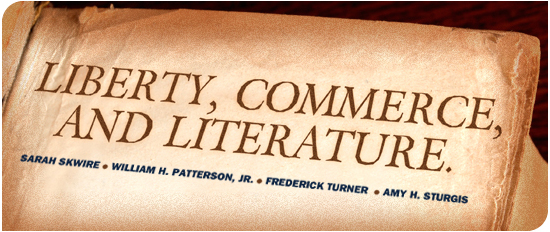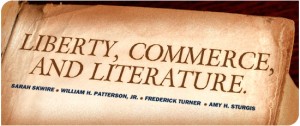
The July issue of Cato Unbound is on the topic of Liberty, Commerce, and Literature — more specifically, whether Western literature is anti-commerce, to what extent, and why.
Like Prometheus Unbound, Cato Unbound is an online magazine, unbound and free of the limits of the dead-tree format, although they maintain a regular monthly schedule while we do not. Each month they cover a different big topic and invite several eminent thinkers to discuss it.
Cato Unbound invites their readers to take part in the discussion on their own websites, blogs, social networks, and the like. Particularly good posts could be officially included in the issue.
Lead Essay
This month’s lead essayist is literary scholar Sarah Skwire. In “Birth of the Clichés,” she argues that — contrary to mainstream and libertarian perception — the evidence that Western literature is anti-commerce is actually thin. Instead, she presents a more nuanced view “in which critiques of the market stand side by side with favorable depictions and even sound, encouraging advice for would-be businessmen.”
Response Essays
The first response essay, “Three At-Risk Children of the Enlightenment,” is by William H. Patterson, Jr., the foremost scholar of the great libertarian science fiction author Robert A. Heinlein and himself the author of the authorized biography Robert A. Heinlein: In Dialogue with His Century (Tor Books, 2010). Patterson argues that liberty, commerce, and literature have a common root in the European Enlightenment and that “the fortunes of all three have risen and fallen over time.” He hopes all three will flourish in the coming decades.
In “The Economics of Shakespeare… and His Critics,” Frederick Turner, an accomplished poet and literary theorist, “offers a structural explanation for why literary scholars have been so eager to supply anti-commercial readings to the western canon. Literary criticism began among gentlemen; it then passed to the anti-commercial meritocracy of the universities. But alternate readings exist, and Turner even offers a startlingly pro-commerical reading of The Merchant of Venice.”
In “Stranger in a Familiar Land,” Amy H. Sturgis, a libertarian, intellectual historian, and active member of the speculative fiction community, “argues that much of the apparent anti-market bias in literature stems from elitism. By excluding genre fiction, mainstream literary critics also exclude many thoughtful and provocative treatments of markets and their place in political economy. Often the excluded works are highly sympathetic to libertarian ideals. Fiction shapes public opinion, including public opinion about markets, and popular fiction by definition reaches more than any other kind.”
Related at Cato
Book Forum: Robert A. Heinlein: In Dialogue with His Century, discussion with the author, William H. Patterson, Jr., (video).
Essay: “Why Do Intellectuals Oppose Capitalism?” by Robert Nozick.
Blog Post: “Mario Vargas Llosa’s Nobel Prize” by Ian Và¡squez.















